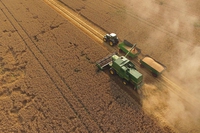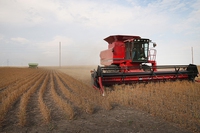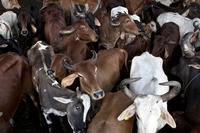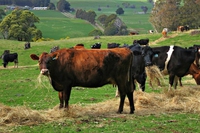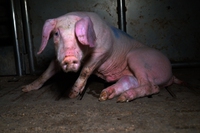
The heartbreaking lives of pigs raised for meat
Animal Equality reveals the brutality of Europe’s pig meat industry and illegal activities on farms for which many perpetrators haven’t yet been punished.
Animal Equality reveals the brutality of Europe’s pig meat industry and illegal activities on farms for which many perpetrators haven’t yet been punished.
Saving soil, water, greenhouse gases and animal lives without giving up the taste of meat. This is Beyond Meat’s gamble. We spoke to chairman Seth Goldman about why the switch to plant based meat alternatives is paying off.
Agriculture and climate change are deeply intertwined. The effects of global warming on food supply are dire, whilst world population is increasing. It’s time to change the way agriculture affects the environment, and vice versa.
Lab meat, also known as cultured or bio meat, is grown in a laboratory using animal cells entirely outside of an animal’s body. China has signed a 300 million dollar deal to partner with Israeli high-tech companies like SuperMeat, Future Meat Technologies and Meat the Future, which are three of only eight companies in the world growing
What’s hidden behind a simple hamburger? Hundreds of thousands of kilometres of forest in Brazil and Bolivia that don’t exist anymore, just to start.
Plant based foods are ones in which ingredients aren’t derived from animals. As well as vegetables, legumes, grains, nuts and seeds, the trend in the growth of “fake” meats and plant based milks provides even more options for those seeking alternatives to meat and dairy consumption. These act as substitutes to meat and dairy by imitating animal
If the whole world decides from now on to cut out meat and dairy products from its diet, more than 8 million lives would be saved by 2050, according to a study carried out by the University of Oxford. Moreover, it shows that the massive adoption of vegetarian or vegan diets – on a global level –
Secondo uno studio svedese, solo se mangeremo meno carne bovina e latticini potremo centrare i target di riduzione delle emissioni di gas ad effetto serra.
A British study revealed clear differences between organic and non-organic meat and milk: the former contain 50% more omega-3 and are higher in vitamins and antioxidants.
Secondo uno studio condotto da Chatham House e dall’Università di Glasgow le persone sarebbero propense a ridurre il consumo di carne per motivi di salute e per ridurre l’impatto ambientale.

